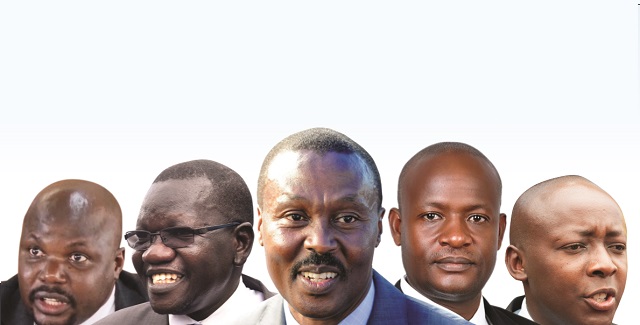
In 2012 it was party stalwart Nandala Mafabi, who is currently the party Secretary General. Nandala lost to Muntu following a heavily divisive campaign, which has kept the party divided into two camps.
It took Muntu a lot of compromise to keep the party together. Although he fired Nandala who was the Leader of Opposition (LoP) at the time, he had to replace him with Wafula Oguttu, who belonged to the opposing camp.
During the debate, Amuriat described Museveni’s government as a “dictatorship that has matured” and announced that once he is elected FDC president, “the debate over which approach the party needs to use to over throw the dictatorship will end.
On the other hand Muntu was walking on glass and treaded carefully, with the subtlest attacks on Besigye.
He appeared to speak plainly when he told the delegates: “I think there is consensus that we need to build strong institutions and establish systems because however good we may be as individuals, however strong we may be as individuals, the sustenance of any good institution must be based on strong and functioning systems not on the goodwill of any individual.”
But everybody in the hall understood the coded message as an attack on Besigye who is accused of building a personality cult in FDC akin to that of President Yoweri Museveni, whom he has been trying to overthrow for about two decades.
Muntu also used the debate to indirectly punch holes in the strategy of Amuriat/Besigye and their defiance camp. He described Museveni as a headache; a symptom but not the disease afflicting Uganda.
“There are many people who are looking for solutions for a headache,” Muntu told delegates, “But we, at least myself and a few colleagues I know, are not just looking to treat a headache. We are looking to resolve the sources of what causes headaches in the political climate of this country.
“That is why we invest in democracy and establishing an institution that is built on a very strong foundation.
“As FDC we realised we can’t build this country alone,” he said. Again, this appeared an indirect attack on Besigye’s defiance campaign, which has been criticised of being too radical and incapable of appealing to moderates in other parties.
The other candidates— Dan Matsiko and Moses Byamugisha also made their pitches. Masiko sought to exploit the rivalry between the defiance and organisation camps, while Byamugisha, who was the youngest in the race at 35, targeted the party’s youth supporters.
Muntu’s aim has been to beat his challengers in the party and finally face off with Museveni. Even after beating Amuriat and retaining the presidency, he would need a united party, not divided by the outcome of the presidency race. So he joined all candidates in pledging to accept the outcome of the election.
“I am a democrat and not a talking one but a practicing one,” Muntu said, “I have participated in four elections and lost thrice and I have not disagreed. I stand my ground. Even when I lose, I do not look at myself but the institution of FDC.” He definitely hopes his challengers will emulate him.
 The Independent Uganda: You get the Truth we Pay the Price
The Independent Uganda: You get the Truth we Pay the Price





